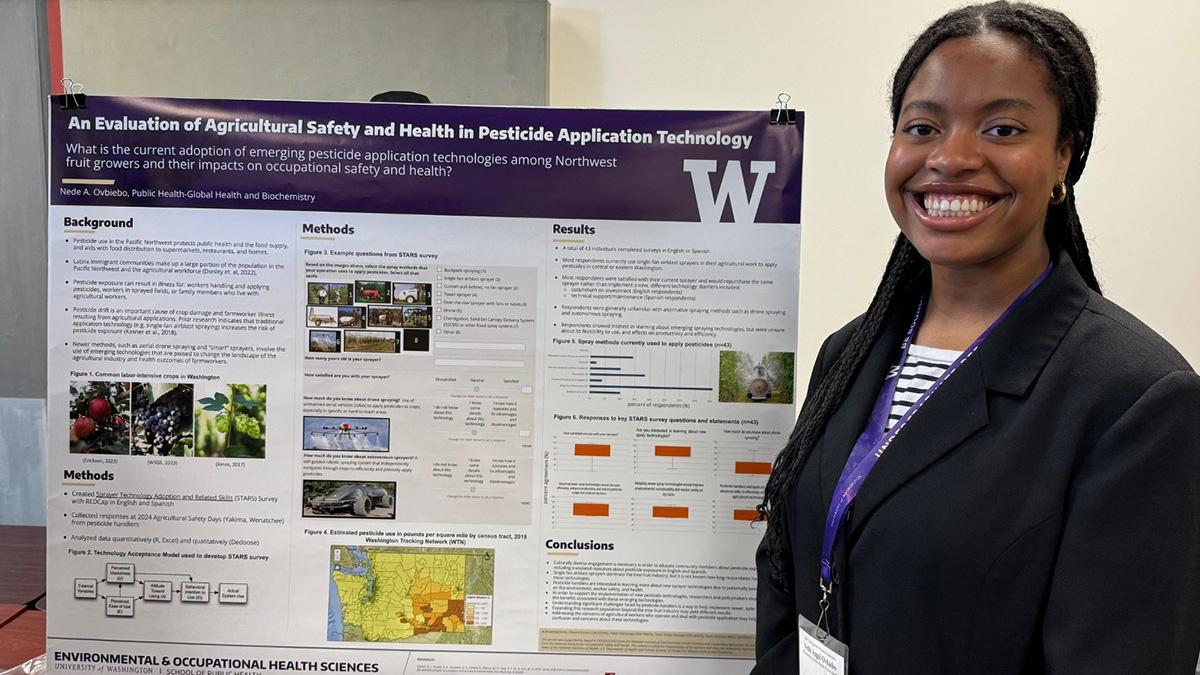
Nede Ovbiebo
Biochemistry (BA) and Public Health-Global Health (BS)
Hometown
Federal Way, WA
Future plans
Continuing to gain more valuable experiential learning experience prior to pursuing a career in healthcare and environmental public health policy.
“It is imperative to remember that the research we perform today has the potential to make an impact tomorrow.”
- Nede Ovbiebo
Nede Ovbiebo is a recent graduate of Biochemistry and Public Health-Global Health. She joined SURE-EH in June 2022 under the mentorship of Dr. Lianne Sheppard, Professor in the Department of Environmental and Occupational Health Sciences. In June 2023, she began working with Dr. Eddie Kasner and Pablo Palmández, also in the Department of Environmental and Occupational Health Sciences.
Her new research area focused on the question, “What is the current adoption of emerging pesticide application technologies among Northwest fruit growers and their impacts on occupational safety and health?” Nede assisted with evaluating emerging pesticide application technologies as an intervention for breaking the pesticide exposure pathway on Northwest fruit farming systems. She finalized a bilingual survey for deployment and then analyzed responses qualitatively and quantitatively.
Nede has a broad range of interests and skills, including creative writing. Outside of her studies, she served as the co-president of the award-winning Capillaries Journal of Medical Humanities on campus. She put these skills to use during her time as a SURE-EH student over the past two years.
Q: How did you become interested in Environmental and Occupational Health Sciences, and specifically Agriculture?
Following the conclusion of my previous project, which studied the effects of Traffic-Related Air Pollution (TRAP) on physical performance, Dr. Lianne Sheppard recommended that I meet with Dr. Eddie Kasner to discuss ongoing PNASH Center projects that requested the help of a SURE-EH trainee. One of these projects involved pesticide application technologies, which I had been introduced to through my SPH 381: Science in Public Health class, taught by Eddie Kasner and Sarah Benki-Nugent. I believed that this pesticide project would be a great way to apply my previously learned public health curriculum knowledge to outside the classroom, and I started from there.
Q: What are the aims of your current research project?
My research area is focused on the question “What is the current adoption of emerging pesticide application technologies among Northwest fruit growers and their impacts on occupational safety and health?” I assisted with evaluating emerging pesticide application technologies as an intervention for breaking the pesticide exposure pathway on Northwest fruit farming systems. I finalized a bilingual survey (REDCap) for deployment and then analyzed responses qualitatively (Dedoose) and quantitatively (R).
My role in this project involved me performing many tasks, particularly development of the Sprayer Technology Adoption and Related Skills (STARS) Survey. I assisted with both the construction and translation of the REDCap survey, integrating both quantitative and qualitative questions into the survey before a final copy of the survey was deployed to tree fruit farm workers in the Pacific Northwest. I helped in the creation of questions which assessed attitudes towards adoption of new pesticide sprayer technologies, including drone sprayers, smart sprayers, and autonomous sprayers. After deployment, I assisted with the analysis of the responses received.
Q: Would you tell us what a typical day in your position is like?
Each day, I reviewed a recommended list of concerns regarding sprayer technologies given to me, and strategically planned which questions to ask regarding these concerns. After adding these questions to the survey, I worked extensively with Pablo Palmández to review, revise, and translate these questions into Spanish and English. I met weekly with both Pablo and Eddie to update them about my progress and make revisions as needed.
Q: Can you share some of the preliminary findings of your research?
The single-fan airblast sprayer method seems to be the most popular method used to apply pesticides among the respondents surveyed so far. The survey will remain open through 2024 for anyone who uses a sprayer in Washington or Oregon. Additionally, I found it interesting that more respondents would opt to keep their current sprayer method rather than implement a newer one if provided the opportunity. Though respondents were generally interested in learning about newer sprayer methods, plenty of factors stood in the way of these technologies being implemented. These included available technical support, liability, and costs associated with implementation.
Q: What do you hope the impact of your research will be?
I am hopeful that this project will lead to the implementation of safer, more sustainable agricultural practices and protection of biodiversity. By assessing the responses from our survey, I believe that this research can help to create better guidelines, policies, and regulations regarding pesticide usage and application technologies. It is imperative to remember that the research we perform today has the potential to make an impact tomorrow. Furthermore, I hope that the results of this research will lead to the dissemination of culturally relevant career development and education tools to raise awareness about the risks associated with pesticides among agricultural communities in the Pacific Northwest.
Q: What’s next for your research and for the project?
The survey will continue to collect responses, which will be further analyzed by the PNASH Center team in 2024. This process is expected to continue for the next several years and will most likely conclude with the presentation of published research findings.
Q: What are your plans after graduation?
My postgraduation plans include continuing to work in research, as I currently assist with other projects outside of SURE-EH. I eventually plan to further my education as well.
Q: Where do you see yourself in the future?
I see myself working within the areas of healthcare and public health, hopefully as a provider, researcher, and health equity advocate. I believe that public health research involves a lot of interdisciplinary collaboration and can provide the evidence base needed to make a positive impact on the communities involved. My experiences as an undergraduate researcher within the School of Public Health have inspired me to pursue a career where I can focus on addressing complex health issues, promote preventive measures, and improve outcomes on an individual and population level.
Dennise Drury is the Outreach and Education Specialist for PNASH Center.


